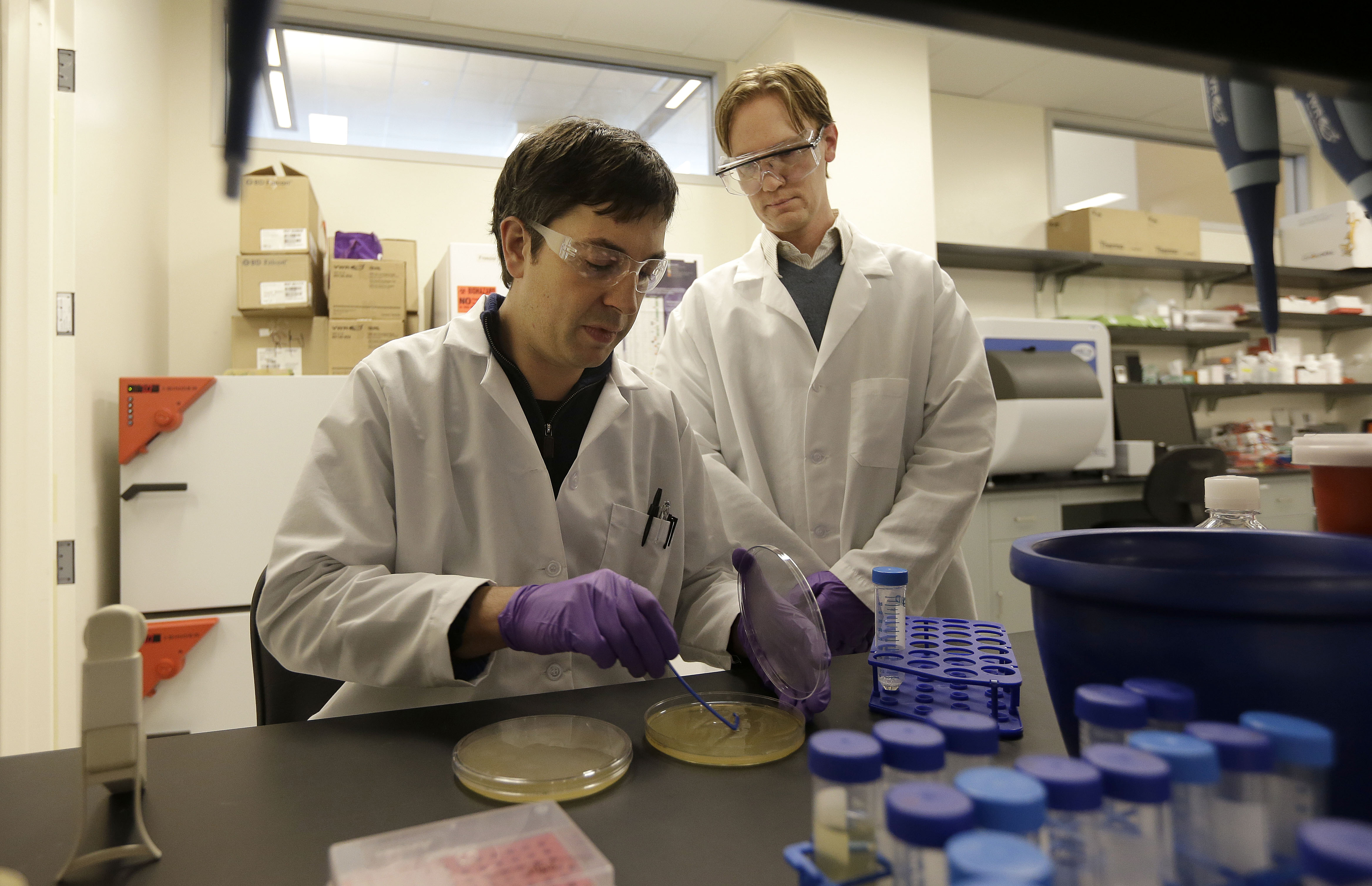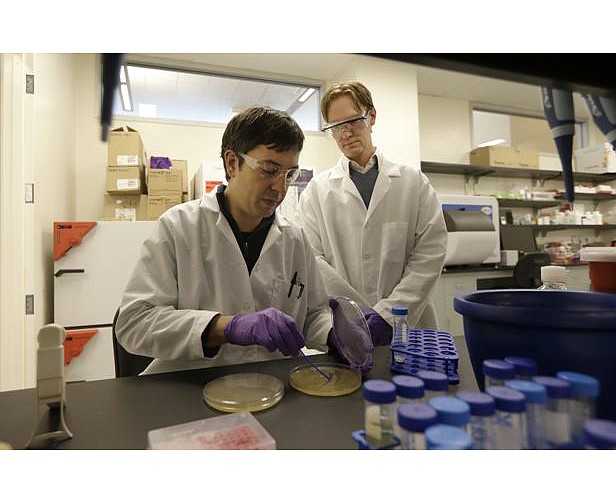 Matt Drever, left, scrapes bacteria from an agar plate during an antibody phage experiment as Charlie Holst watches at the Pfizer laboratory at the the University of California at San Francisco (UCSF) Mission Bay campus. Pfizer Inc., Astra Zeneca PLC and Eli Lilly and Co. are among the major international drug companies signing seven-figure, multiyear umbrella agreements with schools such as New York University, Harvard and the University of California-San Francisco. The deals cover a range of research projects and offer campus scientists access to once-proprietary experimental drug compounds owned by the corporate labs.
Matt Drever, left, scrapes bacteria from an agar plate during an antibody phage experiment as Charlie Holst watches at the Pfizer laboratory at the the University of California at San Francisco (UCSF) Mission Bay campus. Pfizer Inc., Astra Zeneca PLC and Eli Lilly and Co. are among the major international drug companies signing seven-figure, multiyear umbrella agreements with schools such as New York University, Harvard and the University of California-San Francisco. The deals cover a range of research projects and offer campus scientists access to once-proprietary experimental drug compounds owned by the corporate labs.ST. LOUIS - In their quest for the next big drug discovery, pharmaceutical companies are increasingly teaming up with some of the nation's top universities, recruiting campus scientists as partners and offering schools multimillion-dollar deals to work on experimental drugs in development.
Big Pharma has long sought to profit from academia's innovations in more limited arrangements. Now the two sides are often joining forces as equals. But the drug makers' aggressive pursuit of university research has drawn the ire of academic purists who question whether the partnerships put profits ahead of, or on equal footing with, science for science's sake.
"What it does is to blur the boundaries between academic medical centers and investor-owned companies," said Dr. Marcia Angell, former editor-in-chief of the New England Journal of Medicine and a prominent critic of the pharmaceutical industry's new coziness with major campuses.
Pfizer Inc., Astra Zeneca PLC and Eli Lilly and Co. are among the major international drug companies signing agreements with schools such as New York University, Harvard and the University of California at San Francisco.
Driving the change is the expiration of patents for such lucrative name-brand drugs as Seroquel, Lipitor and Protonix, which industry observers say accounted for nearly $36 billion in U.S. sales in 2011 and 2012. More than ever, drug makers need new revenue to replace diminished profits from drugs that now have generic rivals.
"There's a real need on Big Pharma to be innovative in how it fills its pipeline," said Van Ellis, a Washington-based life-sciences lawyer and partner with the Morrison & Foerster firm. "And academia is incredibly concerned with how to support research."
A 2011 research report by the Biotechnology Industry Organization found that just 1 in 10 prospective drugs in clinical trials from late 2003 through 2010 ultimately received approval from the federal Food and Drug Administration, a testament to the low success rates of drugs still in the experimental phase. Previous reports showed an approval rate of 1 in 5 or 1 in 6.
One of the earliest campus collaborations was announced in 2010 between Washington University in St. Louis and Pfizer, which signed a five-year, $22.5 million deal to identify new uses for hundreds of drug compounds for which research had stalled during or on the verge of clinical trials.
At the time, Dr. Larry Shapiro, dean of the university's medical school, expressed his hope that the project would yield "many discoveries."
But Washington University's experience illustrates some of the industry's challenges. Scarcely two years later, Pfizer shut down the St. Louis lab to focus on partnerships at other schools.
A Washington University spokeswoman referred questions about that decision to the drug maker, which said in a statement the decision was a joint one that "evolved to reflect the mutual needs and strengths of both organizations."
Pfizer, based in New York, is continuing to fund its five initial research projects with the university, but has higher hopes for its five-year, $85 million partnership with the University of California at San Francisco, where two dozen Pfizer scientists are practically working side-by-side with their university counterparts in a 20,000-square-foot building on the school's sprawling Mission Bay campus.
Executive Vice Chancellor and Provost Jeffrey Bluestone, whose own research has focused on the body's immune response at the molecular level, said the university's Center for Therapeutic Innovation creates an open network of researchers that goes beyond the narrow focus on specific projects initially cultivated in campus labs on behalf of drug manufacturers.
"There was an opportunity to try to think differently about the relationship between industry and academia," he said. "Typically, industry partnerships had been at arms-length, and often at great distances, where you would try to fit a (university) research project in with your (full-time) job you had with the company."
The new collaborations allow scientists to spend more time on research and less on paperwork, Bluestone added.
"With the idea that we do this together, we don't have to worry about intellectual property and tech transfer and all that really early on," he said. "We can build in milestones and timelines that allow us to really make decisions along the way. ... It's really a different model."
Those arguments don't mollify Angell, who is now a senior lecturer at Harvard Medical School's Division of Medical Ethics.
Academic medical centers and teaching hospit
